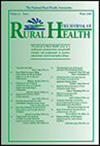“Everything cannot be handled virtually”: Understanding intention and use of digital health technologies among rural adults and rural cancer survivors
Abstract
Purpose
This qualitative study assessed internet access and use, barriers and facilitators to participating in digital health interventions or programs, and the engagement experience in virtual versus in-person health interventions among rural adults and rural cancer survivors.
Methods
Rural adults (n = 10) and rural cancer survivors (n = 10) were recruited from previous studies to participate in an in-depth interview. The interview guide contained eight open-ended questions related to participation in technology-based programs. Interviews were recorded and transcribed, and transcripts were analyzed for emergent themes using a thematic content analysis approach.
Findings
Rural adults were younger (M age = 37.9 ± 11.8 years), more likely to be non-Hispanic Black (90.0%), and reported higher educational attainment (50.0% earned a master's or doctoral degree) compared with rural cancer survivors (M age = 63.0 ± 9.1 years, 70.0% non-Hispanic White, and 20.0% earned a master's or doctoral degree). Participants discussed performance and effort expectancies related to using digital health technologies or participating in virtual programs and cited positive and negative aspects of in-person and virtual platforms. Participants emphasized the need for social connections and missed opportunities in current virtual offerings along with factors that influence their use of technologies (e.g., prior experience, tech anxiety).
Conclusions
Findings from this qualitative study provide an in-depth understanding of the intricate experiences of rural adults and rural cancer survivors when engaging with digital health technologies. Integrating the experiences of rural adults and rural cancer survivors may aid in developing clinical and community-based interventions and policies that support increasing access to digital health services and programs for rural communities.

 求助内容:
求助内容: 应助结果提醒方式:
应助结果提醒方式:


